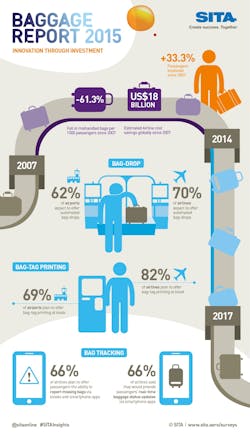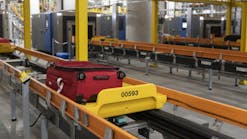Airlines $18 Billion Richer For Not Losing My Luggage
Technology is making mishandled luggage less and less likely. according to the 2015 Baggage Report, an annual study done by SITA.
Over the past seven years, airlines and airports have lost 61 percent fewer bags, according to latest numbers, and saved $18 billion dollars in the process.
The numbers are particularly admirable considering the relentless pace of air travel. Out of every 1,000 passengers, only 7.3 bags were mishandled last year - despite a one-third increase passenger enplanments from 2007, with 3.3 billion passengers boarding planes last year.
TECHNOLOGY
SITA’s CEO Francesco Violante attributes improvements in baggage handling technology and new baggage processing systems for these improvements.
“The investment the industry has made in baggage systems automation and processes have made a huge difference to the reliability and speed of baggage delivery, in particular for bags transferring from one flight to another,” he says. “For instance, SITA’s community baggage systems processes more than 2.5 billion messages annually, helping ensure that bag and passenger travel on the same flight.”
And in order to stay on top of this performance, Violante adds means more investment in further automation and better baggage tracking are essential going forward.
“Given the success already in bringing down the mishandling rate, driving further incremental improvements is going to be that much harder,” he says. “We have already seen the additional pressure in 2014 of record load factors and a 5.4 percent uplift in the number of passengers nudge the mishandling rate up to 7.30 bags per thousand passengers, from 6.96 the previous year.”
Projected increases in passenger numbers, he indicates, will put pressure on the industry to invest in technology including baggage systems automation.
“The industry cannot afford to become complacent,” Violante explains. “With IATA forecasting continued passenger growth of around 7 percent in 2015, all industry partners will need to continue to invest, collaborate and focus on baggage management.”
PAX TOO
But it's not just up to the aviation industry. Many of the improvements depend on passengers doing their part. Services like at-home baggage tag printing, self-check luggage bins at airports, and luggage tracking apps combine to help airlines and airports handle luggage more efficiently.
“Baggage processing and management ranked among airports’ top investment priorities, with investments in self-service processes, such as kiosk and bag-drop technology leading the way,” Violante adds.
Over the next three years, the report says that almost six our of 10 airports indicated that they would invest in major self-service programs since many tech-friendly customers want to have some control over their flights and ensure that their bags are waiting for them at the carousel.
Consider some of these numbers from the report:
- 69% of airlines said they would provide passengers with real-time updates on the location of their bags by 2017.
- 66% are looking to provide these updates via smartphone apps by 2017.
- 18% of airlines already offer passengers the ability to report missing bags via self-service kiosks and 10% via smartphone apps.
- By 2017, nearly two-thirds of airlines expect to offer these services.




